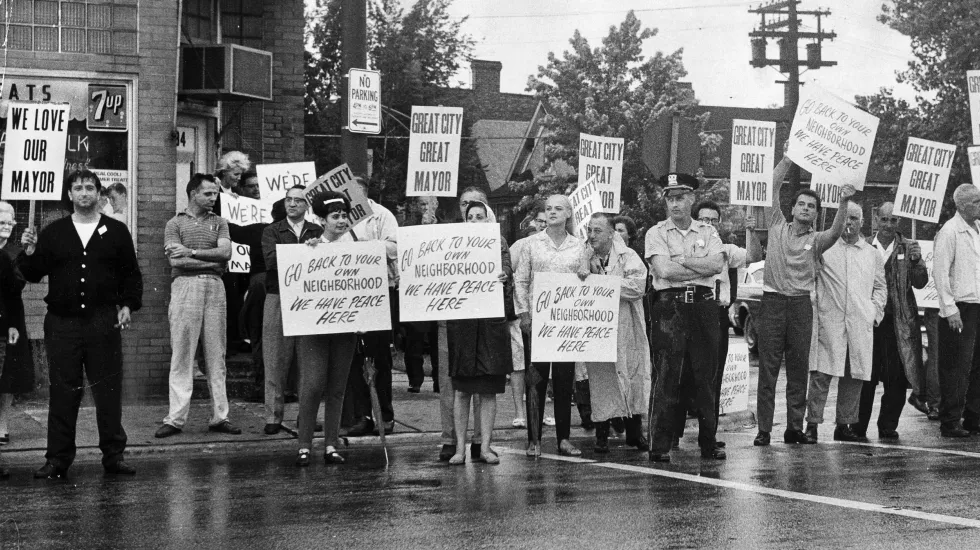
The First Amendment saved America. So far, anyway. In a totalitarian state like Russia, free speech is first to vanish in any crisis. When Vladimir Putin invaded Ukraine, he immediately shut down independent media and banned the word “war.”
That couldn’t happen in America. Yet.
Free speech is studied and supported by legal scholars, now and in the past. Scholars like Harry Kalven Jr., a beloved University of Chicago Law professor who in a book published in 1965 called “The Negro and the First Amendment” offered up a very useful concept: the heckler’s veto. The heckler’s veto is when, Kalven explained, authorities interfere with free speech to protect the speaker, supposedly, in the face of public hostility.
Opinion
A textbook example of the heckler’s veto occurred in Chicago the year the book was published. Comedian Dick Gregory led a protest against the inferior education Black children were given at Chicago Public Schools.
They marched to Mayor Richard J. Daley’s home in Bridgeport and were met by a howling mob, hurling eggs and rocks. The police asked the demonstrators to leave and, when they didn’t, arrested them, explaining that the mob was too big to arrest. The Illinois Supreme Court upheld their actions.
The case went to the Supreme Court, where in Gregory v. City of Chicago, Justice Hugo Black evoked the heckler’s veto in ruling for Gregory. Our constitutional rights cannot be shouted down.
The heckler’s veto raises its hand and clears its throat whenever Mayor Lori Lightfoot claims the city can’t have statues of Christopher Columbus because police officers were hurt defending them. The Columbus statues, erected to celebrate Italian pride, have become, to many, symbols of society’s acceptance of the slaughter of people of color as the price of doing business. This 180-degree cultural shift from veneration to contempt completely eludes the resilient knot of Columbus fans, who have performatively tied their self-worth to public display of Columbus, while the mayor stakes out an argument against the statues that is actually the best reason the statues should stay.
This casts the Columbus statues as a form of speech, which they certainly are. But whose speech? The statues belong to the city, which constantly removes old statuary for a variety of practical reasons. Columbus supporters pretend they have a right to demand that the city keep the statues and therefore speak a certain way. But they don’t. Chicago is free to do what it wants, statue-wise, no matter the cries of the vecchi che si lamentano.
I can’t understand how you demand that Chicago honor you now and forever because it honored you once in the past. That something done 130 years ago must continue to be done into eternity despite general opprobrium because you say so. It’s a level of chutzpah I can’t even imagine.
Not to suggest any of this is easy. In introducing the term, Kalven writes:
The problem is a genuine puzzle either way it is decided. If the police can silence the speaker, the law in effect acknowledges a veto power in hecklers who can, by being hostile enough, get the law to silence any speaker of whom they do not approve. But the opposing view, that the police must go down with the speaker, has its obvious difficulties.
Kalven died in 1974, age 60, leaving behind a 1,000-page manuscript about the First Amendment. “Unpublishable as he left it,” his son Jamie Kalven remarked, “but too good to put aside, too precious to cede to death.” So the younger Kalven worked on it for 14 years and published it in 1988 as “A Worthy Tradition.” One reviewer called assembling the book “an act of grace.”
If that son’s name is familiar, it’s because Jamie Kalven’s investigative work disinterred from a police vault the video of Laquan McDonald being gunned down, and jammed it under the gaze of a horrified world. The acorn doesn’t fall far from the tree.
Speech, his father wrote, is so important because “it is the alternate to force as a way of changing men’s actions.” Of course, that assumes anybody listens to anything that anybody else has to say, and the endless, vexatious and pitiable Columbus statue controversy is ample proof otherwise.







